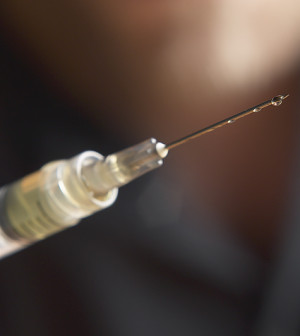- 7 Best Breads for Maintaining Stable Blood Sugar
- Gelatin vs. Collagen: Which is Best for Skin, Nails, and Joints?
- The Long-Term Effects of Daily Turmeric Supplements on Liver Health
- Could Your Grocery Store Meat Be Causing Recurring UTIs?
- Are You Making This Expensive Thermostat Error This Winter?
- Recognizing the Signs of Hypothyroidism
- 10 Strategies to Overcome Insomnia
- Could Artificial Sweeteners Be Aging the Brain Faster?
- Techniques for Soothing Your Nervous System
- Does the Water in Your House Smell Funny? Here’s Why
Whole Fruits Tied to Lower Diabetes Risk


FRIDAY, Aug. 30It’s no secret that fruit is good for you. But what kind? A new study links whole fruits — especially blueberries, grapes and apples — to a lower risk of type 2 diabetes, but suggests that fruit juices may actually raise the risk.
The design of the study, however, doesn’t allow it to prove that whole fruits or fruit juices directly affect the risk of diabetes.
“While fruits are recommended as a measure for diabetes prevention, previous studies have found mixed results for total fruit consumption,” senior author Qi Sun, an assistant professor in the department of nutrition at the Harvard School of Public Health, said in a school news release. “Our findings provide novel evidence suggesting that certain fruits may be especially beneficial for lowering diabetes risk.”
The researchers base their findings on an analysis of nearly 190,000 people who took part in three studies from 1984 to 2008 and weren’t initially diagnosed with diabetes, cardiovascular disease or cancer. About 7 percent of the participants were later diagnosed with diabetes.
People who ate fruits, especially blueberries, grapes and apples, at least twice a week were up to 23 percent less likely to develop type 2 diabetes than those who ate them no more than once a month, the researchers found. But those who drank a serving or more of fruit juice a day had an increased risk, up to 21 percent higher than the others.
What’s going on? It’s possible that something other than fruit and fruit juice consumption could explain the differences. Perhaps people who eat certain fruits share something else in common that affects their risk of diabetes.
“Our data further endorse current recommendations on increasing whole fruits, but not fruit juice, as a measure for diabetes prevention,” lead study author Isao Muraki, a research fellow with the Harvard School of Public Health department of nutrition, said in the news release. “And our novel findings may help refine this recommendation to facilitate diabetes prevention.”
The study appeared online in the Aug. 29 issue of the journal BMJ.
More information
For more about diabetes, try the U.S. National Library of Medicine.
Source: HealthDay
Copyright © 2026 HealthDay. All rights reserved.










